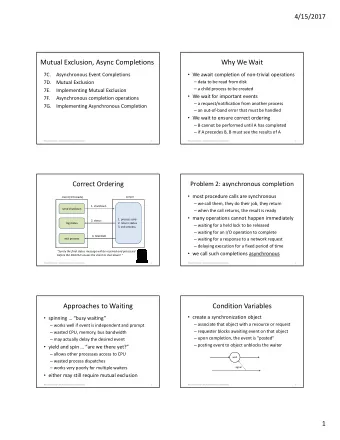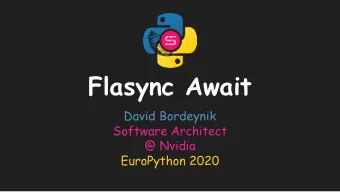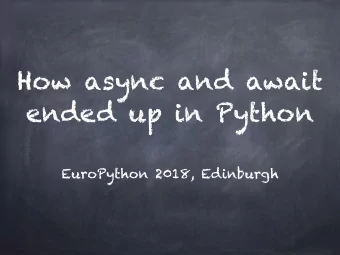
The Talk youve been .await-ing for @steveklabnik async fn foo(s: - PowerPoint PPT Presentation
The Talk youve been .await-ing for @steveklabnik async fn foo(s: String) -> i32 { // } fn foo(s: String) -> impl Future<Output=i32> { // } Stuff were going to talk about async/await and Futures Generators:
The Talk you’ve been .await-ing for @steveklabnik
async fn foo(s: String) -> i32 { // … } fn foo(s: String) -> impl Future<Output=i32> { // … }
Stuff we’re going to talk about ● async/await and Futures ● Generators: the secret sauce ● Tasks, Executors, & Reactors, oh my! ● … maybe async fn in traits
async/await and Futures
Async/await is simpler syntax for Futures
Async/await is simpler syntax for Futures*
A Future represents a value that will exist sometime in the future
Let’s build a future!
A timer future ● Mutex around a boolean ● Spins up a new thread that sleeps for some amount of time ● When the thread wakes up, it sets the boolean to true and ‘wakes up’ the future ● Calls to poll check the boolean to see if we’re done
Four rules For using async/await
async fn foo(s: String) -> i32 { // … } fn foo(s: String) -> impl Future<Output=i32> { // … }
If you have a Future<Output=i32> and you want an i32 , use .await on it
You can only .await inside of an async fn or block
To start executing a Future , you pass it to an executor
Generators aka stackless coroutines
Generators are not stable … yet
Futures need to have poll() called over and over until a value is produced Generators let you call yield over and over to get values async/await is a simpler syntax for a generator that implements the Future trait
Tasks, Executors, & Reactors
“The event loop”
Task: a unit of work to execute, a chain of Future s Executor: schedules tasks Reactor: notifies the executor that tasks are ready to execute
Executor calls poll, and provides a context Interface to the reactor
Let’s build an executor!
async fn foo() { // … }
async fn foo() { spawner.spawn(foo()) // … }
async fn foo() { spawner.spawn(foo()) // … } Executor task queue
async fn foo() { spawner.spawn(foo()) // … } Executor task queue Calls poll() on the Future
async fn foo() { spawner.spawn(foo()) // … } Executor task queue Calls poll() on the Future
async fn foo() { spawner.spawn(foo()) // … } Executor task queue Calls poll() on Future calls the Future wake() (reactor)
async fn foo() { spawner.spawn(foo()) // … } Executor task queue Calls poll() on Future calls the Future wake() (reactor)
A quick aside about Pin<P>
Before a future starts executing, we need to be able to move it around in memory. (For example, to create a task out of it, we need to move it to the heap) Once a future starts executing, it must not move in memory. (otherwise, borrows in the body of the future would become invalid)
When you turn some sort of pointer type into a Pin<P>, you’re promising that what the pointer to will no longer move. Box<T> turns into Pin<Box<T>> There’s an extra trait, “Unpin”, that says “I don’t care about this”, similar to how Copy says “I don’t care about move semantics.
Let’s build a reactor!
(We’re not gonna build a reactor)
(We technically did build a reactor)
Bonus round: async fn in traits
A function is only one function A trait is implemented for many types, and so is many functions
It gets way more complicated
It gets way way way more complicated
● https://rust-lang.github.io/async-book Thanks! ● https://tmandry.gitlab.io/blog/posts/optimizing-await- 1/ ● https://smallcultfollowing.com/babysteps/blog/2019/ @steveklabnik 10/26/async-fn-in-traits-are-hard/
Recommend
More recommend
Explore More Topics
Stay informed with curated content and fresh updates.
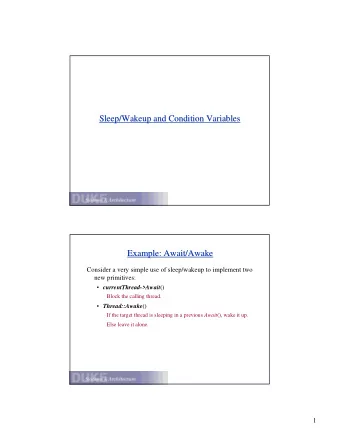

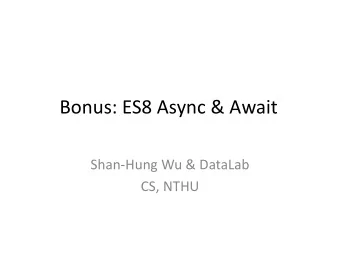

![Testing in Future Space Why you neednt Await for the Future[ScalaTest] Bill Venners Artima,](https://c.sambuz.com/902108/testing-in-future-space-s.webp)


